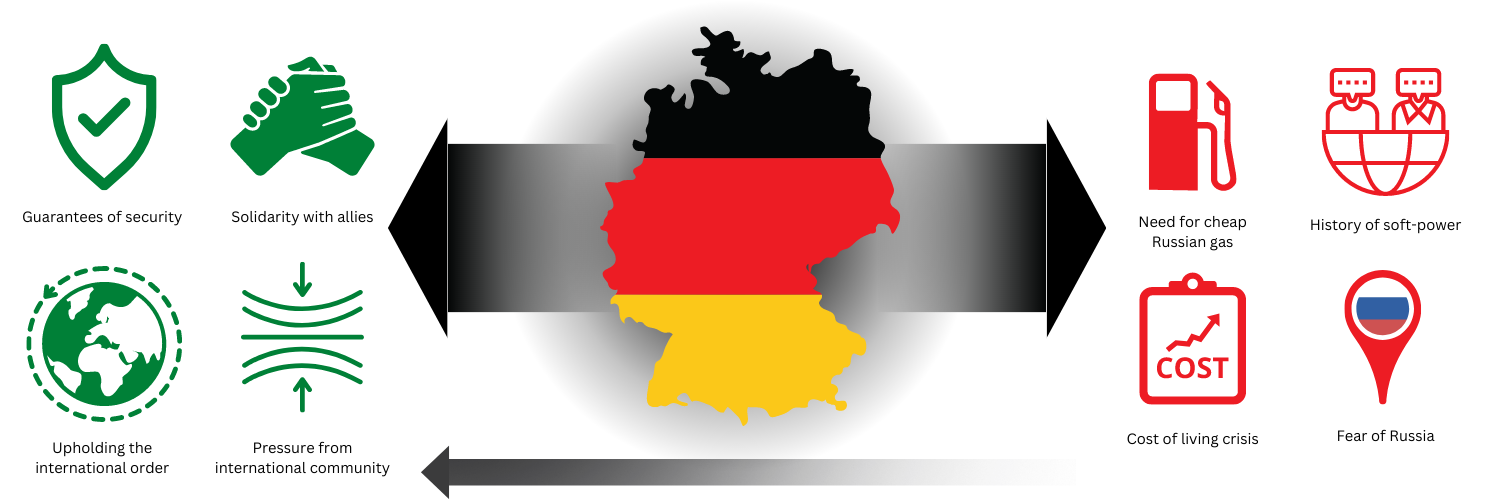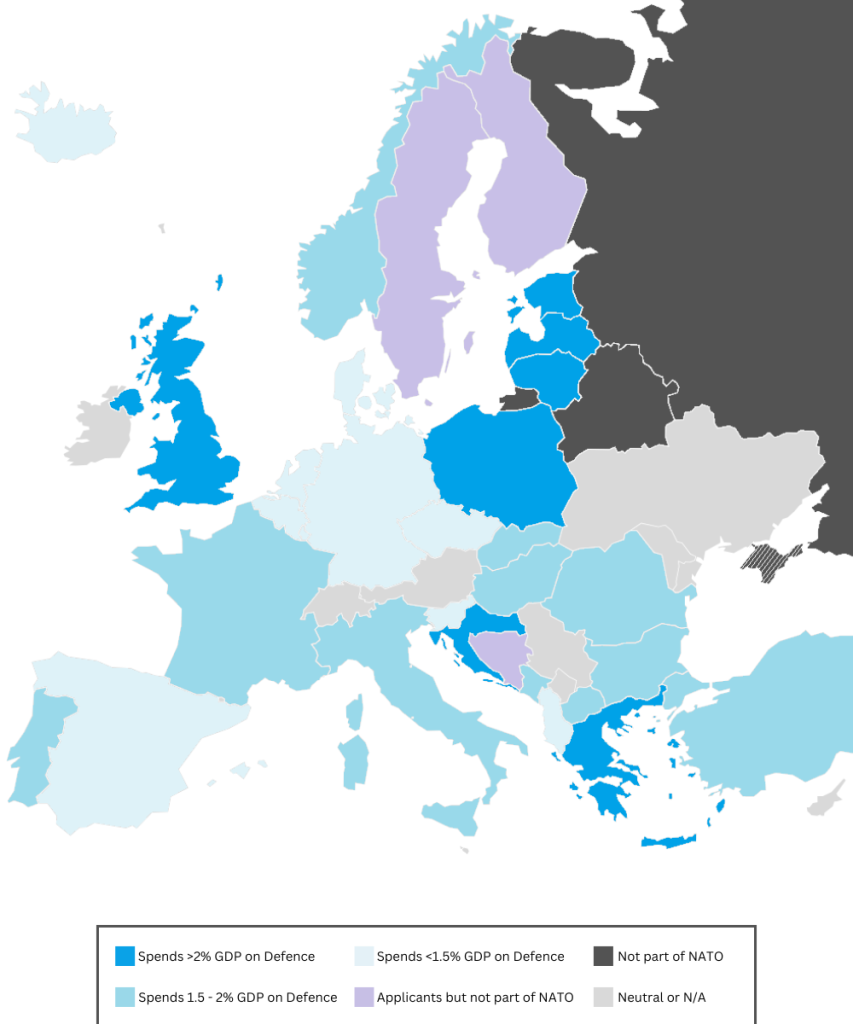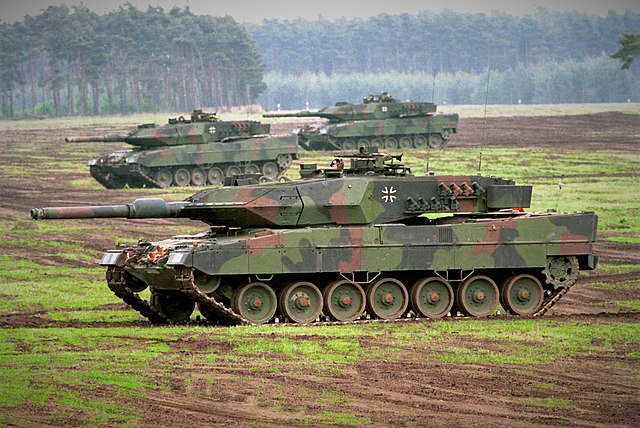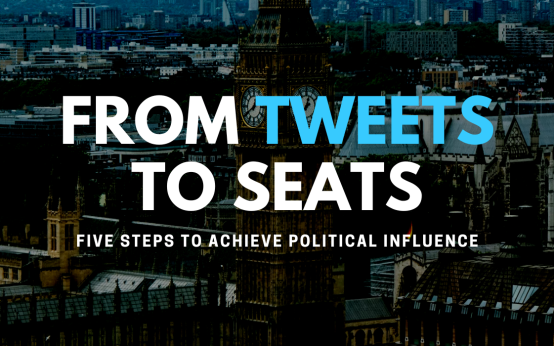Last week, Germany took an extraordinary step in approving the delivery of Leopard II tanks to Ukraine, after weeks of hesitation and indecision. The surface implications of Ukraine getting German tanks are likely plain to see. But behind the scenes, the decision sends an important message to Moscow.

Graphic displaying different forces being put on Germany’s decision to align with West or East
Leopard II Tanks to Ukraine
The decision to send Leopard II tanks to Ukraine is a singularly important one in German foreign policy. It signals to Moscow that Germany remains committed to the issue European security, regardless of the impact this would have on relations with Russia. Indeed, the Russian embassy in Berlin has already stated that the act will lead to a ‘permanent escalation’ and marks Germany’s abandonment of its ‘historic responsibility to Russia’. Moreover, the announcement paralleled the United States’ decision to send M1 Abrams tanks to Ukraine. This reflects Germany’s realignment with Washington and away from Moscow. Berlin is trading in its Neue Ostpolitik, in practice for decades, for a closer relationship with the West.
In fact, the decision represents a dual-message, both to Putin and to the German people. Putin’s supposed “back-door” access into Europe, via German energy needs, has been made more difficult (if not necessarily closed altogether). It also adds significant pressure to Putin’s war efforts. The Ukrainian armed forces are being provided with one of the world’s most advanced main battle tanks.
The message of German tanks being sent to Ukraine is also directed at the German people. It contributes to the solidification of German national resolve around the issue of collective European defence. This act might signal the start of a general realignment of Germany’s place in the world. The need to take part in European security is certainly starting to be more readily accepted.
History of Passivity
With this in mind, it is important to have an understanding of Germany’s recent history. From this, it will become more clear why the decision to provide Ukraine with Leopard II tanks is significant.
For decades, Germany’s foreign policy has been characterised by soft-power politics, exerting diplomatic and economic pressure on friends and rivals alike, in order to achieve their national interests. This worked well for Berlin, which saw Germany’s GDP rise from US $1.87 trillion in 1991, after the reunification of the country, to $4.26 trillion in 2021, giving Germany the fourth highest GDP in the world.
Despite this, soft power has become increasingly difficult to rely on since 2014. The Russian annexation of the Crimean Peninsula acted as a catalyst for a pan-European rethink of defence and security spending. At the Wales Summit in 2014, and under pressure from the United States, NATO leaders agreed to reverse the trends in falling defence budgets.
The Alliance decided that those countries currently falling short of the required level of defence spending would aim to reach the 2% guideline. In 2014, only three countries in the Alliance were spending 2% of GDP or more on defence. This increased to nine in 2022. Germany was not one of these countries, which by 2020 was only spending 1.1% GDP on defence.

Map displaying by-country defence spending within European NATO members
War Returns to Europe
When war broke out in Europe again in February 2022 with the Russian invasion of Ukraine, it once again provided a sharp stimulus to Europe’s conception of defence. Germany was no exception in this regard, with Chancellor Olaf Scholz promising to quickly elevate the country’s defence spending. However, the government backtracked upon this promise only days after it was made, and it is estimated that the national defence budget is actually set to decrease by around $300 million.
Commentators, particularly in the United States, have long criticised Germany and Europe’s general lack of defence expenditure. The prevailing notion is that Europe does not feel the necessity whilst it exists under the US security umbrella. But it is not only critics in Washington condemning German passivity.
Many voices in the German Bundestag have suggested that the country is woefully ill-equipped to deal with the evolving security climate. Indeed, the deputy head of the conservative CDU argued that “the defence ministry is still working like a German bureaucracy in times of deepest peace.” It is reported that German munitions stores are only large enough to last for a few days in the event of conflict.
German Hesitancy
German hesitancy in sending tanks to Ukraine can be explained by a number of factors. The memory of the country’s twentieth century history remains strong in the German collective conscience. The impact that this has on desires to demonstrate hard-power should not be underestimated. And as previously noted, soft power has been far more beneficial for Germany in recent history. It has allowed them to become the pre-eminent European economic power with a high-degree of global influence.
Moreover, Russia presents a very real threat against Germany. Between 2015 and 2021, over 700 cases of disinformation targeting Germany were identified, in what it has been called ‘a systematic campaign’. The Kremlin regularly seeks to exert influence over Germany, as well as launching attacks to destabilise both the country and the EU.
Most prescient, however, is the very real concern in Germany over its capacity to even reach defence spending requirements. The invasion of Ukraine exposed the dire situation of European energy security. This problem which was extensively felt within Germany’s energy import-reliant economy. In December 2021, Germany was importing over five billion cubic meters of natural gas from Russia. Germany had also been working with Russia since 2015 to construct the NordStream II pipeline from Ust-Luga to Lubmin.
When Vladimir Putin cut gas supplies to Europe in response to western sanctions, the effects were profound. German industry, and therefore its ability to export goods to foreign markets, was significantly impacted. Indeed, Germany now finds itself on the brink of recession. Alternative sources of energy supply from the US and the Middle East will cost Europe, possibly too much, given the ongoing cost of living crisis.
Germany had three options: risk crippling the economy by purchasing expensive fuel from alternative sources; fund renewable energy sources, the effects of which would take time to be felt; or remain open to the possibility of renewing cheap energy supply from Russia. Within this context, Berlin’s motivation for remaining somewhat aloof from the conflict in Ukraine might be better understood. The message that Germany has been sending to Putin was one of detached openness. In effect: we are ostensibly opposed to you, but we might still need to work together. This presented the risk that Russia had a potential “back-door” past the European sanctions regime.
Summary
Ultimately, this decision is indicative of a the axiom: no action, great or small, is absent a message. If a country, group, or individual does something, or even nothing, it sends a message to one audience or another. Understanding this is fundamentally important for anyone concerned about the impact they have.
In finally reaching this decision, Germany demonstrated a tangible commitment to its security obligations within NATO. It signalled a commitment to the rules-based international order by contributing to the widespread rejection of Russia’s actions. Germany has sent a clear message, to foreign and domestic audiences alike, on where it stands.
At Conducttr, we use our state-of-the-art platform to simulate information environments and reflect the challenges experienced by a wide range of customers. Operating in a realistic, virtual information environment, you could train in strategic communications and information operations. Interested in finding out more about what we do? Head over to conducttr.com to learn about our crisis exercising platform.



 Training Cyber Terrorism Professionals
Training Cyber Terrorism Professionals  From Tweets to Seats – 5 steps to winning a political campaign using social media
From Tweets to Seats – 5 steps to winning a political campaign using social media